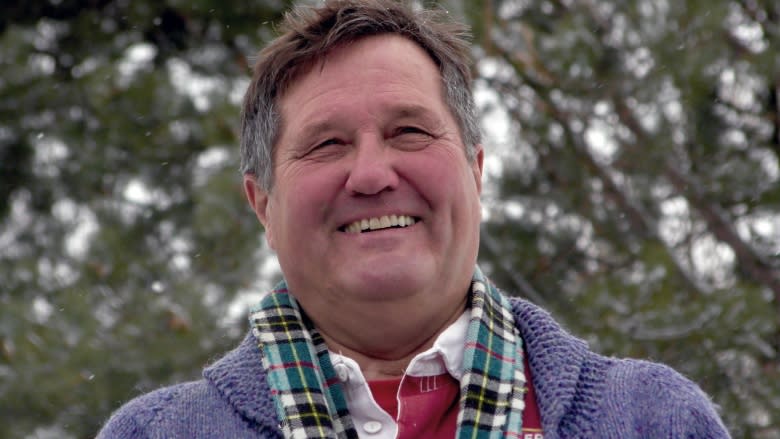Fathering in P.E.I.'s Bygone Days

Reginald "Dutch" Thompson's column The Bygone Days brings you the voices of Island seniors, many of whom are now long-departed. These tales of the way things used to be offer a fascinating glimpse into the past. Every second weekend CBC P.E.I. will bring you one of Dutch's columns.
Roy Clow could split salt cod and rig a sailing vessel, thanks to his father James Clow. Father's Day wasn't much celebrated back at the turn of the last century, but that doesn't mean James Clow wasn't held in much esteem by his offspring.
When Dutch Thompson talked to Roy he was 88 and lived in Montague, P.E.I., but grew up in the nearby fishing community Murray Harbour North. His family had roots back in Scotland, immigrating to P.E.I. and becoming shipbuilders, farmers and merchants.
The beautiful turreted Queen Anne-style Clow House is still in Murray Harbour North across from one of the rural general stores owned by the Clow family. Roy grew up just down the road on the family farm.
'Slick as a mouse'
Like most farmers on P.E.I. at the turn of the last century, Roy's father did a little bit of everything to make a dollar — farming and fishing.
"My father used to make the cod liver oil," that the children took as a vitamin supplement, Roy said. "He'd put a barrel of cod livers out in the sun and let them rot, and the oil would all come to the top and the livers would sink to the bottom. He'd leave it so many weeks there and dip the oil off very careful."
"We used to put it in the horses' oats at dinnertime ... made their hair slick as a mouse. It was figured to be good for everybody," Roy said.
His father once grafted five varieties of apple onto one apple tree. He taught his children how to kill and boil a pig, and to make sure it was shared with the neighbours. He and Roy custom-sawed firewood and threshed grain, and peddled fish door-to-door.
Tough times
Roy's dad became too sick to do the farm work when Roy, the youngest, was only about nine years old — so Roy took over the farm.
He had to stand on the milking stool to harness the horse, he told Thompson.
The family raised $750 to take their dad to Boston for an operation — that was a huge amount of money in the 1920s.
When the Great Depression struck in 1929, James Clow tried again to help out with the farm chores but he was weak, Roy remembered.
"He started coming back in the fields with me and he'd say, 'Now I'd like to put so many potatoes, a couple acres in that field and put wheat in the other side of it and maybe we'll put the turnips out by the house.'"
The family's cattle ate the turnips all winter, Roy recalled, and the Clows sold some to sailing schooners that took them to Newfoundland each fall — although they were getting rock-bottom prices.
"We'd get 15 cents for a two-bushel bag of turnips," he said. Two bushels is about 50 kilograms, or 110 pounds. "Potatoes was the same, but ten cents a bushel — some falls less than that."
'Damn hard sledding'
Roy's dad taught his sons the ways of the ocean. Roy and his brother Stanley both fished off what's known locally as "the bluff" outside Murray Harbour, near the aptly-named Poverty Beach.
But lobster wasn't worth much more than turnips, Roy said.
"My father fished for a cent a lobster. He fished in a sailboat. The sailboat would be full of lobsters right up to the gunnels — he'd probably have 300, 400 pounds. Three or four dollars [was] a pretty good day's pay then ... it was damn hard sledding," Roy said with a laugh.
When Roy began fishing lobster it was worth less than two cents per pound.
Roy's father died in 1936 at age 60, when Roy was still a teen.
Roy joined the navy when war broke out in 1939 and also worked on a Norwegian sealing vessel once, saving the ship by welding a hole smashed in its side off Newfoundland and Labrador.
Passed on his sense of humour
Despite the hard times, the Clow family of seven kids always had plenty to eat and clothes to wear, Roy said, and shared with less fortunate neighbours.
Roy's dad passed on a wry Scottish sense of humour, he said, and spoke Gaelic, as did many people in the community from Celtic roots.
"Chester Martin, he really knew Gaelic and could sing in Gaelic, and Alan Cameron and Glen William from Scotland, they couldn't talk English when they came over here, it was all Gaelic," Roy said.
James didn't teach his children Gaelic but would play tricks on people using the language, Roy said.
"My father had a few dirty words and he'd tell them to somebody and say 'You meet so-and-so, you say it to them.' Maybe it'd be an old lady and she'd haul away and belt him one!" Roy said with a laugh.
More P.E.I. news

